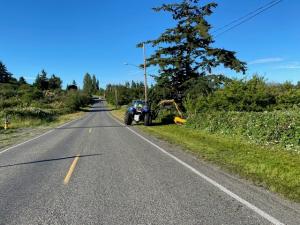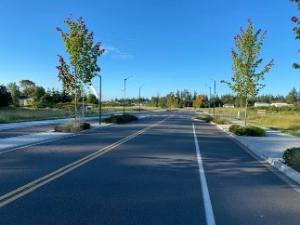Comprehensive Streets Program
What do you want for your streets? How do we best preserve, improve, operate and program our streets sustainably into the distant future?
Why develop a Comprehensive Streets Program?
The 80+ mile City street system is largely in a state of disrepair. Competing priorities and needs for our public rights of way are defined by the City’s complete streets policy, Non-motorized plan and Transportation Functional Plan. City budgets for the street system are relatively small and yet the public enjoys an extensive network of streets connected by trails throughout the City. In order to address priorities and investment levels, a Comprehensive Street Program identifies needs, opportunities, and strategies to make the most out of our street system and use of limited tax dollars as well as consider new funding sources, such as a Transportation Benefit District. In other words, the Comprehensive Streets Program serves as the road map for actions implementing investments into Port Townsend streets and rights-of-way. Your input will be included in the development of this program for the City Council’s consideration as well as consideration of existing and potentially new resources dedicated to streets.
The following outline of the Comprehensive Streets Program provides an overview of the topics to be explored and covered.
- Introduction and Background: The transportation system is based on the fundamental policies set forth for the City’s extensive rights-of-way resulting from a historic pre-platted city. Over time, the street and trail system has been developed in a non-traditional way giving Port Townsend unique opportunities and challenges associated with the management of a transportation system.
- Street Operations: Operations include street sweeping, vegetation control, garbage management, pothole repair, striping, signing, lighting, events, vegetation control, landscaping maintenance, rights of way management, sweeping, snow plowing, engineering support, and education.
- Street Improvements: The City’s Six-Year Transportation Improvement Plan includes investments into the street system that make a street better such as; adding sidewalks, Americans with Disabilities Act facilities, lights, bike lanes, and landscaping. Street improvements also include reconstruction of failed streets such as the need to fix Lawrence Street and the current Discovery Road project. In addition, developers often are responsible for street improvements, and thus development standards impact the form and function of the City street network.
- Street Preservation: Preserving streets involves making significant investments into streets to preserve the pavement and sidewalks to maintain a state of good repair instead of the costly reconstruction. Pavement preservation investments are necessary to create a fiscally sustainable street system. The City currently does not have a funding source or allocation for pavement preservation.
- Street Programming: Many uses of the City’s rights-of-way are possible beyond auto use. As an example, street festivals, parades, and events are important to the community. Other uses of the rights-of-way include landscaping, sidewalks cafes, bike lanes, parking, transit facilities, plazas, and traffic calming features to name a few.



Objectives/Desired Outcome(s):
Develop a publicly supported Comprehensive Street Program with a funding program to implement services reflecting the public’s level of expectations. Only those elements of the program funded will be accomplished, and thus establishing new revenue for streets is an anticipated outcome.
Fiscal Considerations:
Presently, the City funds applied to streets are comprised of 39% of the City's 22% utility tax and Motor Vehicle Excise Tax, or fuel tax, along with administrative fees for managing the City's garbage collection services contract. The total street fund revenue is estimated at approximately $1.17 million as described in the 2023 budget. Given the City’s low housing density and a relatively high number of street miles, the current program is fiscally unsustainable. Prioritization of services and potentially new revenue will be required to create a sustainable street program that better meets public expectations. Continuation of the current practices will result in further decay of the street system infrastructure.
Additionally, the City’s transportation plans include millions of dollars in street improvement needs including sidewalks installation, ADA improvements, safety improvements, traffic calming, and arterial street reconstruction.
Recommendations:
The City Council recognizes the need for new, and additional, revenue to start making progress on repairing the City's street system. In addition to new revenue, City staff recommend the following approaches be implemented:
- Transition mowing of property frontage to abutting property owners. Most City residents currently maintain their street frontage. This transition creates equality in maintenance of vegetation. Until this year, 30% of the City's labor was dedicated to vegetation maintenance. This transition has allowed City staff to work on drainage control necessary to preserve the streets. Water is the number one enemy of streets, especially in Port Townsend, where most of the ditches have filled in over time.
- Focus on preservation of the streets that are still in good shape. Preventative maintenance saves millions of dollars. The current condition of Lawrence Street is a good example of what happens when there is a lack of preventative maintenance.
- Raise revenue by $1.5 million. The City Council Infrastructure and Development Committee recommended increasing revenue by $1.5 million to achieve objectives identified in the Comprehensive Streets Program with a focus on repairing existing streets along with furthering non-motorized transportation objectives. Revenue options include raising fees, securing property tax dollars, utilizing Real Estate Excise Tax, and asking the community to vote on the creation of a Transportation Benefit District.
Transportation Benefit District (TBD):
The City Council may implement a 0.1% sales tax increase by vote of the Council. The City Council may also offer the public the opportunity to vote on an additional 0.2% sales tax increase for streets. Adding an additional 0.3% to the current sales tax rate of 9.1% results in an aggregate sales tax rate of 9.4%. The additional 0.3% sales tax will generate an additional estimated $800,000 dedicated for streets.
The revenue generated from the District may be used to either fully, or partially, invest in, construct, improve, operate, preserve, maintain, and/or fund transportation improvements within the District as follows:
- Citywide pavement repair, rehabilitation, and preservation of the City's street system estimated at $500,000 per year. The City developed a preliminary pavement assessment and the list of streets in need of repair are available for review at this link. Note, any privately maintained streets in this list are not eligible for funding.
- Street Improvement Projects in the current Six-Year Transportation Improvement Plan and as amended annually by the City Council are estimated at $300,000 per year. This improvement plan is a long list list of projects that are typically funded through state and federal grants. $300,000 per year investment leverages approximately $1.5 million in grant funds for streets. A copy of the most current Six-Year Transportation Improvement Plan list of projects are available here for review.
- Citywide gravel road repair, rehabilitation, and paving estimated at $50,000 per year. Investment in gravel road paving reduces maintenance costs allowing additional resources to be invested in pavement preservation throughout the City.
- Citywide sidewalk/ADA construction, upgrades, and repairs estimated at $100,000 per year. The City is required to address accessibility for all users. Using grants and fees along with new revenues, the City will be able to focus on installation of sidewalks at strategic locations to create continuous pedestrian routes connecting pedestrian destinations.
- Citywide traffic calming estimated at $30,000 per year. Along with pothole repair, traffic calming is one of the most highly requested items for improving roadway safety for pedestrians, bicyclists and motorists.
For the purposes of the Transportation Benefit District, the cost of construction, operation, preservation, maintenance, engineering, right-of-way, construction management, legal, finance, administration, and any other costs associated with transportation project investment shall be deemed transportation improvement.
Materials available for review associated with each section of the program:
- Introduction
- September 16, 2020: Council Transportation Committee – Comprehensive Streets Program Preview | Meeting Video | Presentation
- February 8, 2021: City Council Work Session – Comprehensive Streets Program Preview | Meeting Video | Presentation
- Comprehensive Streets Overview and Rights of Way - March 2, 2022, Council Infrastructure and Development | Meeting Video | Presentation
- Rights of Way Presentation - February 22, 2022, Parks, Recreation, Tree, & Trail Advisory Board | Meeting Video | Agenda
- Public Outreach: Outreach consists of meetings, public engagement events, and a summary of public comments will be available for Council’s consideration.
-
Street Operations:
- January 1, 2021: Council Transportation Committee – Comprehensive Street Program | Meeting Video | Presentation
- Street Operation Details - April 6, 2022, Council Infrastructure and Development | Meeting Video | Presentation
- May 10, 2021: Council Workshop Meeting | Meeting Video | Presentation
- Street Improvements:
- February 17, 2021: Council Transportation Committee | Meeting Video | Presentation
- Development Standards for Development Initiated Improvements - May 4, 2022, Council Infrastructure and Development | Meeting Video | Presentation
- August 3, 2022 Council Infrastructure and Development | Meeting Video | Presentation
- November 2, 2022, Council Infrastructure and Development | Meeting Video | Presentation
- Street Preservation:
- May 19, 2021: Council Transportation Committee | Meeting Video | Presentation
- June 13, 2022 City Council Work Session – Banked Capacity | Meeting Video | Presentation
- Street Programming:
- April 22, 2021: Council Transportation Committee | Meeting Video | Presentation
- Traffic Calming: Edge Lane Roads - Summer 2023 Installations
- Traffic Calming: Edge Lane Roads - July 5, 2022, City Council Business Meeting. Meeting Video | Presentation
- Traffic Calming: Traffic Calming Circles - Washington Street - December 16, 2020, Transportation Committee | Presentation
- Traffic Calming: Traffic Calming Circles - Washington Street - November 18, 2020, Transportation Committee | Presentation
- Traffic Calming: Traffic Calming Circles - Washington Street - September 16, 2020, Transportation Committee | Presentation
- Traffic Calming, Edge Lane Roads - March 2, 2022, Council Infrastructure and Development | Meeting Video | Presentation
- Traffic Calming, Edge Lane Roads – May 4, 2022, Council Infrastructure and Development | Meeting Video | Presentation
- Funding Strategy:
- December 16, 2020: Council Transportation Committee | Meeting Video | Presentation
- January 4, 2023: Council Infrastructure and Development Committee | Meeting Video | Presentation
- January 9, 2023: City Council Workshop | Overview of Strategy Development | Meeting Video
- February 1, 2023: City Council Infrastructure and Development Committee | Funding Strategy Development Meeting 2 : Meeting Video | Presentation
- March 1, 2023: City Council Infrastructure and Development Committee | Funding Sounce Allocations | Meeting Video | Presentation
- Recommendations and Conclusions: https://cityofpt.us/engagept/page/financial-sustainability-initiative
Final Report: Comprehensive Streets Program
Final Report References:
Traffic Calming Guidebook Draft
Comprehensive Streets Program: Vegetation Control
Rights of Way- Principles Overview
Edge Road Lanes (ELR) Presentation
Estimated Schedule:
- Spring and Summer 2022: Street Program Study and Public Outreach
- Fall 2022: Funding Options
- Winter 2022/23: Program Adoption
- Spring 2023: Implementation
- Watch our Streets Video!
Contact Information:
Brian Reid | Streets Operations Manager | breid@cityofpt.us
Steve King | Public Works Director | sking@cityofpt.us | (360) 379-5090
